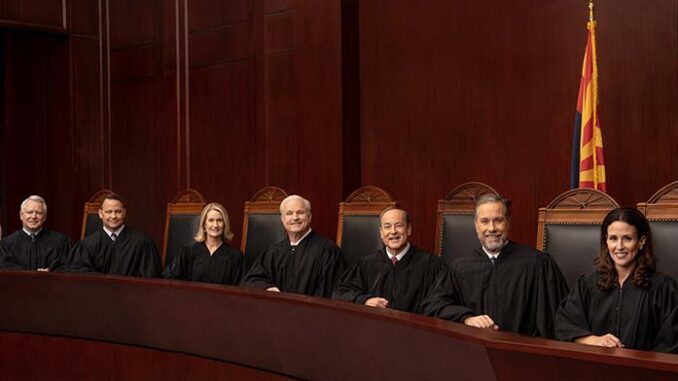
The Arizona Supreme Court’s willingness to deliver justice in a timely fashion is once again being called into question upon the release of its agenda for the upcoming conference. While Arizonans have waited nearly 2 years for the Court to consider key election cases, the Court announced it will consider petitions for review on the three remaining election contests from 2022 the day after this coming Election Day.
The Court’s announcement, issued on Friday, stunned both attorneys and politicos due to what they say is its obvious decision to protect judges up for re-election from any consequences of their decisions from both voters on the left and right.
Hamadeh v. Mayes et al, Finchem v. Fontes, and Lake v. Hobbs et al are among the cases on the Court’s Wednesday, November 6, 2024, agenda.
The so-called ’60-day’ rule is an unwritten but largely accepted rule normally followed by the courts and the Department of Justice that prohibits an entity from acting on a matter if it should give even the appearance of affecting an election.
However, not acting on these cases in a timely manner and scheduling them the day after the 2024 election smacks of election interference involving the campaigns of Justices Clint Bolick and Kathryn King.
The Court’s action looks especially inappropriate given that Hamadeh’s case was fully briefed on June 10, giving the Court ample time to consider and rule before the 2024 election cycle heated up.
As for Kari Lake’s case, it was fully briefed on August 12, and Finchem was fully briefed on August 28.
“So, after sitting on these petitions related to election contests from 2022 for months, where they could have been heard at the August, September, or October conferences all three petitions will be considered on a Wednesday, the day after the 2024 election, where all 3 petitioners are on the ballot,” one politico told the Arizona Daily Independent. “The timing, in my opinion, is suspicious.”
What is also suspicious to some is the fact that the Court chose a Wednesday rather than follow its normal conferencing schedule of Tuesday or Friday.
Legal experts say that if the Court denies all three cases, it appears as if the justices are taking a shot across as the bow of lawyers as voters await the vote totals for the 2024 races. It will, in effect, warn candidates considering election challenges in 2024, that if they file a contest, it will take years, and it will be fruitless, despite the weight of evidence.
Further, legal experts say, if you add the release of the agenda to the Court’s October 15 Administrative Order, the Court seems to be thumbing their nose at discovery issues raised by Hamadeh’s case, where provisional ballot information was withheld by Maricopa County, and instead of clarifying the discovery rules for election contests, the Court truncated the timelines to make an election contest, particularly for the presidential race, nearly impossible.
“On November 6,”one lawyer told the ADI, “the Court is poised to send a very clear message: there is no justice for poorly administered elections EVEN where government officials lie in court and withhold evidence.”
The Court has full discretion as to when to conference a petition for review. This schedule, given that the cases were fully briefed at different times and could have been considered and resolved months ago, appears to be not only by design, but likely a highly political decision.
Currently the Court is under the leadership of Chief Justice Ann A. Scott Timmer. Timmer, who became Chief Justice on July 1, 2024, is the sister of Hamadeh and Lake’s most viscous critics, progressive Arizona Republic columnist Laurie Roberts.

